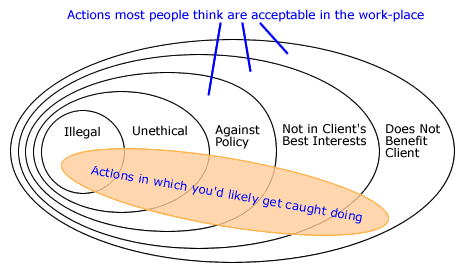 Business ethics in the workplace is about prioritizing moral values for the workplace and ensuring behaviors are aligned with those values — it’s values management. Yet, myths abound about business ethics. Some of these myths arise from general confusion about the notion of ethics. Other myths arise from narrow or simplistic views of ethical dilemmas.
Business ethics in the workplace is about prioritizing moral values for the workplace and ensuring behaviors are aligned with those values — it’s values management. Yet, myths abound about business ethics. Some of these myths arise from general confusion about the notion of ethics. Other myths arise from narrow or simplistic views of ethical dilemmas.
Myth 1: Business ethics is more a matter of religion than management. Diane Kirrane, in “Managing Values: A Systematic Approach to Business Ethics,”(Training and Development Journal, November 1990), asserts that “altering people’s values or souls isn’t the aim of an organizational ethics program — managing values and conflict among them is …”
Myth 2: Our employees are ethical so we don’t need attention to business ethics. Most of the ethical dilemmas faced by managers in the workplace are highly complex. Wallace explains that one knows when they have a significant ethical conflict when there is presence of a) significant value conflicts among differing interests, b) real alternatives that are equality justifiable, and c) significant consequences on “stakeholders” in the situation. Kirrane mentions that when the topic of business ethics comes up, people are quick to speak of the Golden Rule, honesty and courtesy. But when presented with complex ethical dilemmas, most people realize there’s a wide “gray area” when trying to apply ethical principles.
Myth 3: Business ethics is a discipline best led by philosophers, academics and theologians. Lack of involvement of leaders and managers in business ethics literature and discussions has led many to believe that business ethics is a fad or movement, having little to do with the day-to-day realities of running an organization. They believe business ethics is primarily a complex philosophical debate or a religion. However, business ethics is a management discipline with a programmatic approach that includes several practical tools. Ethics management programs have practical applications in other areas of management areas, as well. (These applications are listed later on in this document.)
Myth 4: Business ethics is superfluous — it only asserts the obvious: “do good!” Many people react that codes of ethics, or lists of ethical values to which the organization aspires, are rather superfluous because they represent values to which everyone should naturally aspire. However, the value of a codes of ethics to an organization is its priority and focus regarding certain ethical values in that workplace. For example, it’s obvious that all people should be honest. However, if an organization is struggling around continuing occasions of deceit in the workplace, a priority on honesty is very timely — and honesty should be listed in that organization’s code of ethics. Note that a code of ethics is an organic instrument that changes with the needs of society and the organization.
Myth 5: Business ethics is a matter of the good guys preaching to the bad guys. Some writers do seem to claim a moral high ground while lamenting the poor condition of business and its leaders. However, those people well versed in managing organizations realize that good people can take bad actions, particularly when stressed or confused. (Stress or confusion are not excuses for unethical actions — they are reasons.) Managing ethics in the workplace includes all of us working together to help each other remain ethical and to work through confusing and stressful ethical dilemmas.
Myth 6: Business ethics in the new policeperson on the block. Many believe business ethics is a recent phenomenon because of increased attention to the topic in popular and management literature. However, business ethics was written about even 2,000 years ago — at least since Cicero wrote about the topic in his On Duties. Business ethics has gotten more attention recently because of the social responsibility movement that started in the 1960s.
Myth 7: Ethics can’t be managed. Actually, ethics is always “managed” — but, too often, indirectly. For example, the behavior of the organization’s founder or current leader is a strong moral influence, or directive if you will, on behavior or employees in the workplace. Strategic priorities (profit maximization, expanding marketshare, cutting costs, etc.) can be very strong influences on morality. Laws, regulations and rules directly influence behaviors to be more ethical, usually in a manner that improves the general good and/or minimizes harm to the community. Some are still skeptical about business ethics, believing you can’t manage values in an organization. Donaldson and Davis (Management Decision, V28, N6) note that management, after all, is a value system. Skeptics might consider the tremendous influence of several “codes of ethics,” such as the “10 Commandments” in Christian religions or the U.S. Constitution. Codes can be very powerful in smaller “organizations” as well.
Myth 8: Business ethics and social responsibility are the same thing. The social responsibility movement is one aspect of the overall discipline of business ethics. Madsen and Shafritz refine the definition of business ethics to be: 1) an application of ethics to the corporate community, 2) a way to determine responsibility in business dealings, 3) the identification of important business and social issues, and 4) a critique of business. Items 3 and 4 are often matters of social responsibility. (There has been a great deal of public discussion and writing about items 3 and 4. However, there needs to be more written about items 1 and 2, about how business ethics can be managed.) Writings about social responsibility often do not address practical matters of managing ethics in the workplace, e.g., developing codes, updating polices and procedures, approaches to resolving ethical dilemmas, etc.
Myth 9: Our organization is not in trouble with the law, so we’re ethical. One can often be unethical, yet operate within the limits of the law, e.g., withhold information from superiors, fudge on budgets, constantly complain about others, etc. However, breaking the law often starts with unethical behavior that has gone unnoticed. The “boil the frog” phenomena is a useful parable here: If you put a frog in hot water, it immediately jumps out. If you put a frog in cool water and slowly heat up the water, you can eventually boil the frog. The frog doesn’t seem to notice the adverse change in its environment.
Myth 10: Managing ethics in the workplace has little practical relevance. Managing ethics in the workplace involves identifying and prioritizing values to guide behaviors in the organization, and establishing associated policies and procedures to ensure those behaviors are conducted. One might call this “values management.” Values management is also highly important in other management practices, e.g., managing diversity, Total Quality Management and strategic planning.
Read Full Post »
 On April 14th, Joseph Nacchio, the former CEO of Qwest Communications, began his prison sentence, after a judge sentenced him to serve six years for insider trading in 2007. After a two-year period of post conviction jockeying of appeals and delays, Nacchio began his sentence at a minimum-security prison in Minersville, Pa. In addition to serving prison time, Nacchio has been ordered to pay $71 million in fines and forfeitures.
On April 14th, Joseph Nacchio, the former CEO of Qwest Communications, began his prison sentence, after a judge sentenced him to serve six years for insider trading in 2007. After a two-year period of post conviction jockeying of appeals and delays, Nacchio began his sentence at a minimum-security prison in Minersville, Pa. In addition to serving prison time, Nacchio has been ordered to pay $71 million in fines and forfeitures. The time has long since come to reverse
The time has long since come to reverse  A March 11, 2008 article in The Chronicle of Higher Education notes that the American Association of Medical Colleges and the American Medical Association have written a joint letter asking Congress to reverse the Department of Education’s decision to end a program that has allowed new physician graduates to lower student loans and defer interest on their student-loan payments.
A March 11, 2008 article in The Chronicle of Higher Education notes that the American Association of Medical Colleges and the American Medical Association have written a joint letter asking Congress to reverse the Department of Education’s decision to end a program that has allowed new physician graduates to lower student loans and defer interest on their student-loan payments. Business ethics in the workplace is about prioritizing moral values for the workplace and ensuring behaviors are aligned with those values — it’s values management. Yet, myths abound about business ethics. Some of these myths arise from general confusion about the notion of ethics. Other myths arise from narrow or simplistic views of ethical dilemmas.
Business ethics in the workplace is about prioritizing moral values for the workplace and ensuring behaviors are aligned with those values — it’s values management. Yet, myths abound about business ethics. Some of these myths arise from general confusion about the notion of ethics. Other myths arise from narrow or simplistic views of ethical dilemmas.  In the US, the consensus regarding the need for ethical business practice has been codified in The Revised Sentencing Guidelines and expanded by the Sarbanes-Oxley Act. Meeting the demands of these directives demands ethical leadership. As an example of ethical leadership of the highest order, consider the case of Jawaharlal Nehru.
In the US, the consensus regarding the need for ethical business practice has been codified in The Revised Sentencing Guidelines and expanded by the Sarbanes-Oxley Act. Meeting the demands of these directives demands ethical leadership. As an example of ethical leadership of the highest order, consider the case of Jawaharlal Nehru.  In an article in today’s
In an article in today’s